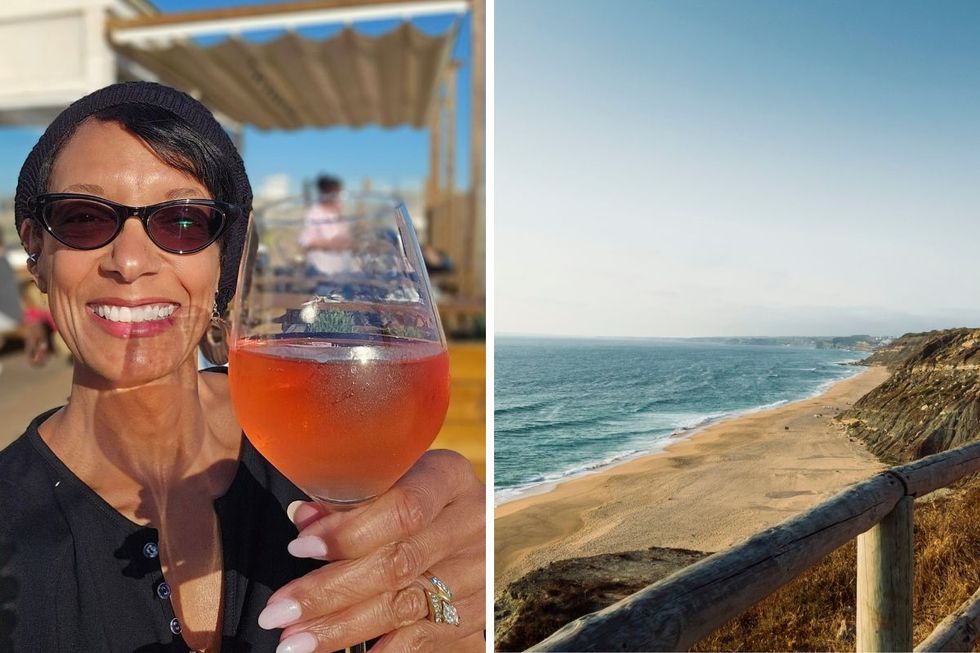GB News is talking to British expats across Europe and the world who have exclusively revealed the best places to live, tips and tricks for moving abroad, and the potential pitfalls to avoid. This week, an expat in Portugal shared the details of her idyllic life by the ocean
Don't Miss
Most Read
Trending on GB News
Portugal is a gorgeous country that Britons flock to in their masses year after year for sunshine, sea, beautiful landscapes, and delicious food and wine.
Natalie Wester, 64, uprooted her life and started a new adventure in Lourinha, Portugal almost two years ago and completely fell in love with the place. She spoke exclusively to GB News about her expat experience, including why she did it, the best things about the move, and advice she would give to others who want to relocate.
Having worked as a business consultant for 14 years and a primary school teacher for another 14, Natalie was ready to relax, retire and relocate come September 2022.
The expat wanted to pack up and leave her home when she entered retirement and started researching Portugal because of its temperate climate and low cost of living.

Natalie Wester is living the dream by the ocean in Portugal
Natalie Wester

Natalie enjoys picturesque views on a daily basis
Natalie Wester
The gorgeous European country piqued her interest, but because she had never been there before, she booked a quick trip to scope it out. She recommended that potential expats do the same to suss out if they'd also feel at home there.
Natalie resided in an area around 30 minutes south of Lisbon in Sesimbra for one month and fell in love with the life Portugal has to offer. She then spent 70 days travelling the world.
Three years later, when Natalie finally took the plunge and decided to move to Portugal permanently, she found that Sesimbra was a bit too costly. She warned potential expats that, post-pandemic, property prices have "just zoomed up", but thankfully she ended up finding the perfect place to live on the Silver Coast, "the wave capital of the world".
Here, she enjoys a life where her total expenses for rent, healthcare, groceries, transportation, and utilities are less than €2,000 (around £1,708) a month. Natalie was full of praise for the healthcare system - her health insurance, Multi Care Plus, even covers home visits. Natalie is required to have private insurance as an immigrant but revealed that free public healthcare has a huge backlog.
The expat told GB News about her new home in Lourinhã, which she described as her "happy place". She said: "I found the town I'm living in now, on top of a cliff, overlooking the ocean. I go to sleep with the sound of the ocean, it's super affordable, it's not a touristy place and it's very calm, about an hour north of Lisbon."
While Lisbon is certainly a popular holiday destination and also a common choice for expats, Natalie revealed that many are being "priced out" of the expensive capital and end up relocating to Lourinhã.
In the municipality of Lourinhã, Natalie has a very comfortable life. To enjoy the same sort of lifestyle, she told future expats to "avoid moving to overly touristy areas" She said: "If I walk 5km into the village centre of Lourinhã, I can get a coffee and two pastries for nothing - around €1.50 (£1.28). But if you go someplace and they have an English menu, it's going to be three times more expensive."
While Natalie wouldn't be keen to live in pricey Lisbon, her local bus can get her there if she wants a change of scenery. She admitted that the times of the bus are "bizarre", but for just €8 (£6.84) she can travel all the way into the vibrant capital.
She did, however, warn potential expats: "If you're someone who wants to be near a train, this is not the place for you - there are no trains here. I need to take the bus to Lisbon and from Lisbon I can take a train all over the country."
As for Natalie's average day in Lourinhã, the expat admitted it's basically "paradise". She said: "As a fully retired, single woman, my average day starts with meditating by the ocean, and then I'll do yoga. Then I write for about four hours on my blog or on articles others ask me to do.

Lourinhã is Natalie's 'happy place' - she calls it a 'paradise'
Natalie Wester
"If it's not raining, I'll go for a walk, then make dinner - although I'm not a great cook, I haven't become a good chef here.
"A friend might come over or I'll go to a friend's and we'll have a glass of wine. But mostly it's exercise, walking, discovering, and writing - that's me. And if it's date night, we'll watch live music or go to a restaurant, it's whatever you want it to be."
But according to the expat, life is wildly different for expats living in Lisbon - "they're always out".
Revealing the best thing about Lourinhã, the expat said: "For me, it's living by the ocean, as it's always been a dream of mine. To hear the waves, to fall asleep to the sound of the ocean, to wake up and, wow, there it is - to me that's the best because that was my dream.
"It's also the sense of slowing down and the calm, to be away from stress and division. You come here and it's like a detox. There are issues of course, nowhere is perfect, but you just feel more relaxed."
As for the food, it's "delicious" and local. Natalie said: "If you go to the municipal market, you pick up your apples that are grown here, olives that are grown here, your figs are grown here - everything is grown here.
"On my walk through farmland I see the broccoli that I'm eating, the spinach I'm eating, the pumpkin that was in my pumpkin soup the other day - it's the real deal and it's awesome."
However, Natalie, who moved from Ohio, US, did feel a little let down when it came to seafood. The expat was expecting "super cheap" seafood as it was on her doorstep, and she was rather shocked by the price. She said: "It's cheaper than the US but not cheap. It is delicious though."
Reassuringly, Natalie wasn't able to name the "worst thing" about her new life in Portugal, although she did admit she sometimes struggles to figure out how Portuguese appliances work.
Like many expats, Natalie had a few reservations about moving to a new country. She worried about settling into a brand new small town, but revealed that the people were "amazing".

'My average day starts with meditating by the ocean'
Natalie Wester
Natalie's neighbours are incredibly welcoming and friendly. She told GB News: "On my second or third day, one of my neighbours said to me, 'I'm leaving for the day but I've left my door open, here's my WiFi password and go make yourself at home'. Maybe I lucked out, but I've not had a single bad experience."
To settle into Portugal properly, Natalie recommended learning the language. She said: "If you want to move to a country, learn the language and embrace the language. Don't figure out how you can keep your life the same as it was. If you want it to be the same as it was, stay where you are."
LATEST DEVELOPMENTS
It's particularly important to learn the language if you live in a small town. The expat explained that English is spoken in large metropolitan areas but not in smaller places. Her top tip to get around this? Natalie said: "Make sure you have a good translator app with a camera function - because you will be using that a lot."
Natalie also recommended being friendly and saying hello to everyone you meet, explaining: "I think you get back the energy you give." She suggested that it's easier to make friends in smaller towns: "Expats I know in Libson say it is not like that there."
Natalie started learning in the USA but practices day-to-day with children's books and generally tries to converse with Portuguese people. She is also part of a language learning group on the social media platform Meetup.
The language barrier was a lot to get used to for Natalie - and she's still in the process of learning - but she also had to get to grips with a totally new pace of life.
She said: "Things are not going to move fast here. It took me two hours in a bank to open an account, and 90 minutes to have someone sit down with me and sign my account for gas to heat the house. Things aren't quick."
In a similar vein, Natalie explained that things are very relaxed in Portugal. As well as simple tasks taking a long time to complete, "everything shuts" between 1pm and 3pm for lunch and leisure. She warned that this is a culture shock if you're more accustomed to the hustle and bustle - but now she thinks it's "awesome".
For Britons who might be considering relocating to Portugal, Natalie advised: "Take the time to do your research thoroughly. I wasn't surprised by anything really because I had done so much [research] - so just do a lot. Also, spend some time here, don't just think, 'That sounds so cool, maybe I'll move there'."
As for whether the expat would recommend others to move to Lourinhã, she said: "If you are open-minded and outgoing and not expecting to recreate the life that you had in your home country here, yes. And if you're open to embracing a new culture, you will be okay.
"If you are friendly and willing to go with the flow as well, I think a smaller, quieter village is perfect.
"But if you're going to be a - I made up the word 'vexpat', one of those expats that's always going to be annoyed about something not going their way - stay home, don't come here."
Moving to Portugal
What you need to know
Portugal is a beautiful country with plenty to offer holidaymakers and expats alike. But before you relocate there, there are a few things you must know regarding housing and driving. Britons moving to Portugal will also need to be able to get by speaking the language.
British citizens have been given Government guidance on how they can effectively move to Portugal. Britons thinking of purchasing a property abroad can consult GOV.UK for advice on this.
Those moving to Portugal specifically should "consider taking advice from a lawyer who is experienced in land law and property transaction". Britons were advised: "Make sure that they are registered with the law society, Ordem dos Advogados.
"Some notaries, who are trained lawyers in Portugal, offer an independent property purchasing service known as Casa Simples, Casa Segura (in Portuguese).
"If you are thinking of buying a coastal, river or lakeside property, ensure it’s not affected by the 2005 water resources law (in Portuguese).
"If you buy rural property, make sure you comply with the law on preventing forest fires."
Not everyone moving to Portugal will want to buy, and renting is another option. According to the experts at Expatica, renting a property is quicker and easier than buying, as you won't need to take out a mortgage. Additionally, rented accommodation often comes furnished in Portugal.
There are several ways expats can find a home in Portugal. Britons can check out online portals such as Casa Sapo, HousingAnywhere, Idealista and Spotahome. Of course, real estate agents are helpful too and may be able to guide you through the process in English.
For Britons hoping to drive in Portugal, as of December 31, 2023, those holding a full and valid driving licence issued in the UK can "drive in Portugal on your current licence until it expires, provided you have registered your licence with IMT" or "exchange your licence for a Portuguese one without needing to take a test", explained the UK Government.
GOV.UK has detailed guidance on how Britons can begin driving in Portugal, including how to register their license and exchange their license. There is also guidance on bringing a UK-registered vehicle to Portugal and driving with a disability.
Before you relocate for an extended period, it's advisable to scope out the area first. This may mean spending a month in a part of Portugal you think you might like to call home.
While in major cities many people will be proficient in English, in smaller towns this may not be the case. To settle in and make connections in Portugal, it's best to start learning the language before you go. There are many ways British expats can do this, from conversation classes to language-learning apps, to watching TV in the language with English subtitles on.
Foreign nationals who have spent at least five years of legal residence and meet other eligibility requirements can apply for Portuguese citizenship. Those who want to become Portuguese citizens must take the CIPLE Portugal citizenship language test.
Global Citizens Solutions explained: "The simple A2 test ensures that those who obtain citizenship in the country have a basic understanding of Portuguese. Even if you are not seeking citizenship, it is a great way to test your knowledge if you are planning on relocating to Portugal or a Portuguese-speaking country."
The language test is two hours long and is composed of three parts, testing a person's listening, reading, writing and speaking skills.
Best places for retirees
- The Silver Coast
- The Algarve
- Lisbon
- Porto
Why Britons choose to live in Portugal
- Warm climate
- Affordable (depending on where you decide to live)
- Safe
- Incredible landscapes
- Excellent healthcare
- English is widely spoken (although more so in major cities than in smaller towns)
Possible pitfalls
- Language barrier (officials in government offices will likely not speak English)
- Some places operate on a cash-only basis so you will need to remember to carry change
- Bureaucracy can be laborious
- Homes can get cold at night as many do not come with a radiator - you may need to purchase your own heater









